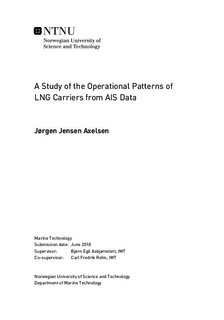A Study of the Operational Patterns of LNG Carriers from AIS Data
Master thesis
Permanent lenke
http://hdl.handle.net/11250/2564502Utgivelsesdato
2018Metadata
Vis full innførselSamlinger
- Institutt for marin teknikk [3436]
Sammendrag
This thesis investigates the operational patterns of LNG carriers from Automatic Identification System (AIS) Data. AIS was created for vessels as a safety-enhancing supplement to the radar, and over the last decade satellites have recorded data that enables new use of it. The overall objective of the thesis is to increase the decision support for stakeholders within the LNG industry.
The work is based on two parts, shipping knowledge and data analysis, and they serve as a foundation for the analyses of the operational patterns.
The most important findings are that LNG carriers sail slower than their design speed, and that the spot part of the fleet does not adjust its speed significantly more than the total fleet from a year of peak rates (2012) to a year of low rates (2015). The work also shows that from 2011 to 2015, an increasing part of the fleet visits more oceans per month. This could imply that the spot market is increasing, which again could indicate that vessels should be designed for a broader range of LNG terminal configurations.
The commoditization theory, which postulates that the increasing LNG spot market will serve to balance the cost differences between the regions and establish a global LNG price, is investigated to see if any leverage for the theory can be found in the data. The work finds weak support for the theory, but numerous assumptions make the results ambiguous.
Further, the thesis suggests that future work should obtain more comprehensive AIS Data, and that the inefficient design speed compared to the actual sailing speed should be investigated. The thesis also suggests other applications of AIS Data to increase the decision support for the participants in the industry, e. g. port calls and shipping distances.
In conclusion, the findings can increase the decision support for the stakeholders in LNG industry. It is emphasized that the numerous assumptions and potentially erroneous data make the analyses incomplete, underscoring that the results should be treated accordingly.
